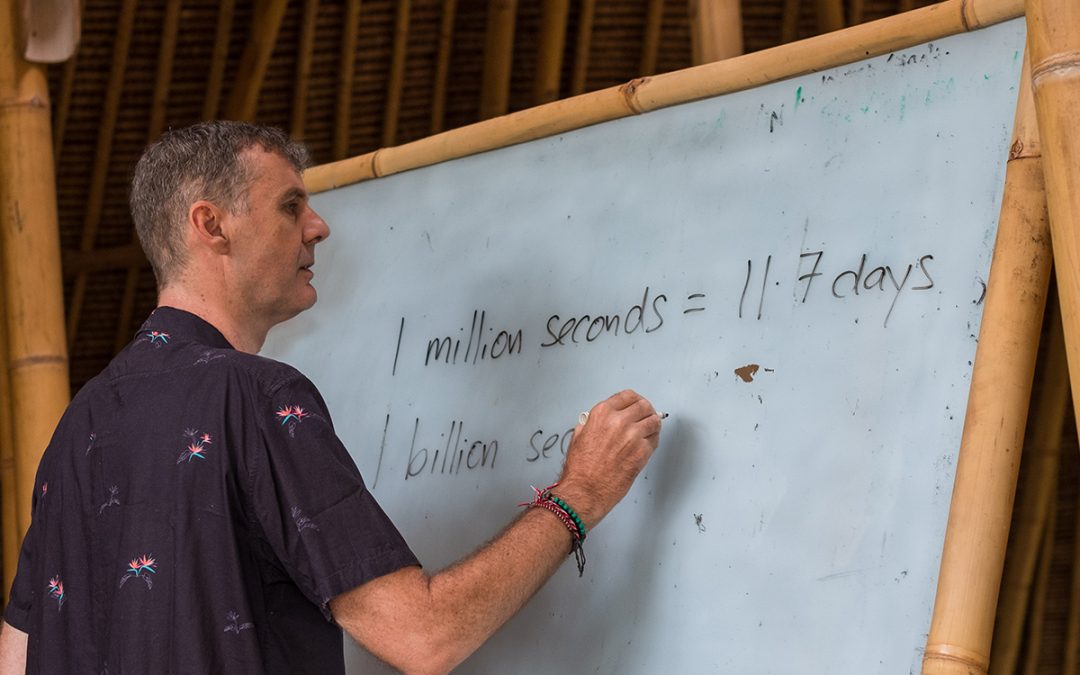None of my friends are billionaires … so I’m not going to lose any friends by writing this blog.
First: use ‘Time’ to understand what a billion is. A million seconds is 11.7 days. A billion seconds is 31.7 years.
I remember teaching a year-ending Thematic class that was based on a mock UN Conference. My Grade 7 students had spent the year focusing on the UN SDGs that were related to Health and Wellbeing. We let students choose the country they wanted to represent and then provided a platform for us to discuss some of the biggest issues the world is facing – poverty, health, production and consumption, and inequality. At GSB, we are all about finding solutions and solving problems. My students came up with sound-reasoned ideas to strategise the achievement of the SDGs – the one thing missing was the money/investment needed to move forward. So, with a simple question: ‘Where do we get this money?’ – I got straightforward answers. Tax the rich. Stop big companies from benefiting from other small companies that are struggling. I distinctly remember one student saying: “We need to stop spending so much money on war, and start spending it on peace”.
And now, as the COVID-19 ripple-effects still emanate across the world – with the number of billionaires rising and their total wealth at a record high – the divide between the incredibly super rich (who couldn’t spend all their money in generations and generations, unless they followed the advice of my Grade 7 students) and the rest is getting wider.
COVID-19 is a tipping point – teetering on the edge of an unknown future feels great if you want an Education Revolution. But I am very mindful that this unknown future is a scary proposal for the millions of people still out of work, destitute, hungry, sick and dying, unable to access financial aid, unable to go to school, unable to log-on to school online. Very scary. Go on – google: ‘how the rich have got richer during CoVid’; and there’s no way any moral, caring and intelligent person could say the ‘wealth divide’ is a good thing. You almost want to crawl up in a ball in the corner – you will wish you never knew.
Know this – and see how it sits with you. Amazon didn’t pay tax for two years in a row. Then in 2019 the tax bill came to just $169 million … 1.2% of the company’s annual income. And Jeff Bezos (the Amazon founder and boss) has increased his wealth by $74 billion this year. Sure – smart guy, kudos for starting up the world’s biggest online shopping business (in an exponential consumerism focused society). But – really? If the Swiss bank USB and PriceWaterhouseCoopers report that the wealth of billionaires stands at around $10.2 trillion (that’s up from the $8.9 trillion high recorded in 2017), I’m guessing that it’s probably more.
It’s simple – not only do the wealthy have money to take the losses and reinvest to make huge profits when markets recover, they also have what is called “significant risk appetite” and are able (and confident) to gamble with some of their immense wealth. When I think about privilege, Significant Risk Appetite comes out on top.
Billionaires must love a crisis. Whether it’s online shopping, pharmaceutical and medical equipment companies, construction businesses, tech giants, military contractors – every global disaster, is just another cash-point for the wealthy. And you’d think governments would do something about it. As if!
Governments need to shut down the ‘hidden wealth economy’ that has billions and billions of dollars (just in tax revenues) stashed away in offshore accounts – tax laws need to change so that big businesses start paying their share. Governments need to focus aid on small businesses and families and not allow big corporations and banks to access grants and loans. We need the establishment of pandemic and disaster profiteering committees to manage the allocation of stimulus money. We need governments to step up – start looking after the people who need it the most.
We obviously can’t wait for governments to start doing their job … that is, govern effectively. We all have a role to play. Consume less, spend less and give more, donate more; if you’re on a good salary, stay on the salary cut when everyone else is getting theirs restored, employ people you don’t need just to give their family an income, organise food drives. We can all help. We need to be more than self-aware about our privilege – we need our actions to be reflective of genuine empathy, compassion and goodwill.
In the first few months of this year, forty million people in the US found themselves unemployed – this terrifying trend of people out of work is a global phenomenon. But the data is worse than you could imagine. Factor in every other country on the planet who has ‘shut down’, and then include all the ‘daily-workers’ in developing countries who woke up one day in April to find everything closed and they didn’t have a job – and you’ve got hundreds of millions of people trying to live with no money. Not just a little money. NO MONEY. Add to that the 700 million people who already lived in ‘extreme poverty’ before the pandemic. With that in mind, go back and read some of your research on how the rich are getting richer and ask yourself if you are part of the problem or part of the solution.
I’m not saying that wealth is wrong – but greed is. Schools need to teach about the real world. Teach about capitalism, teach about extreme poverty, teach a true sense of number, teach about taxes, teach about the wealth divide, teach empathy and integrity, teach good values – teach about the real world so it doesn’t slap students in the face or pass them by unnoticed when they leave school.

